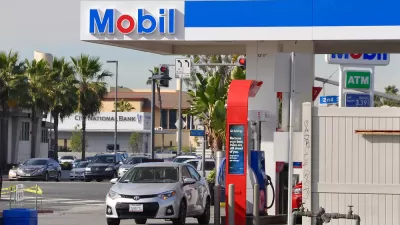Over the weekend, Virginia passed a controversial transportation funding plan that replaces the state's gas tax with a combination of revenue streams. Two California economists look at the flaws with the plan.
Although Virginia Gov. Robert F. McDonnell’s original plan to replace the state’s gas tax with a 16 percent increase in sales taxes didn't fly, the state's legislators have approved a comprose bill that reaches similar ends and some believe "may be even worse."
Fredrick Kunkle and Laura Vozzella break down the final agreement: "The new plan [replaces] the 17.5 cents-per-gallon tax on gasoline — which had not been changed since 1987 — with a new 3.5 percent wholesale tax on motor fuels that will keep pace with economic growth and inflation."
"The deal’s major components also include boosting the sales tax on nonfood merchandise from 5 percent to 5.3 percent and devoting a fatter slice of existing revenue to transportation instead of schools, public safety and other services. And it creates a regional funding mechanism that boosts the sales tax to 6 percent in Northern Virginia and Hampton Roads and requires those funds to be spent only on transportation projects in those areas."
"Supporters praised the plan to raise about $880 million a year, including the new dedicated streams of money for mass transit," add Kunkle and Vozzella, "while opponents spoke out against taxing different parts of the state at different rates or doubling the registration fee on electric cars to $100 and applying it to alternative fuel and hybrid vehicles, too."
In an editorial in The Washington Post, economists Michael Madowitz and Kevin Noonan argue that removing the fixed tax on gasoline at the pump will cause Virginia's transportation revenue to fluctuate drastically.
"Virginia would be best served by an approach that asks people to pay for what they use, assumes inflation will occur and accepts that transportation infrastructure costs money. To do that, all that was needed was indexing the per-gallon gas tax to inflation," they write.
Having studied the effects of a similar approach in California, which experienced a 12 percent fluctuation in revenue difference, Madowitz and Noonan believe the state could have generated a steadier and more predictable revenue stream by taxing motorists at the pump according to inflation.
FULL STORY: Virginia lawmakers approve sweeping transportation plan

Alabama: Trump Terminates Settlements for Black Communities Harmed By Raw Sewage
Trump deemed the landmark civil rights agreement “illegal DEI and environmental justice policy.”

Study: Maui’s Plan to Convert Vacation Rentals to Long-Term Housing Could Cause Nearly $1 Billion Economic Loss
The plan would reduce visitor accommodation by 25% resulting in 1,900 jobs lost.

Why Should We Subsidize Public Transportation?
Many public transit agencies face financial stress due to rising costs, declining fare revenue, and declining subsidies. Transit advocates must provide a strong business case for increasing public transit funding.

Paris Bike Boom Leads to Steep Drop in Air Pollution
The French city’s air quality has improved dramatically in the past 20 years, coinciding with a growth in cycling.

Why Housing Costs More to Build in California Than in Texas
Hard costs like labor and materials combined with ‘soft’ costs such as permitting make building in the San Francisco Bay Area almost three times as costly as in Texas cities.

San Diego County Sees a Rise in Urban Coyotes
San Diego County experiences a rise in urban coyotes, as sightings become prevalent throughout its urban neighbourhoods and surrounding areas.
Urban Design for Planners 1: Software Tools
This six-course series explores essential urban design concepts using open source software and equips planners with the tools they need to participate fully in the urban design process.
Planning for Universal Design
Learn the tools for implementing Universal Design in planning regulations.
Smith Gee Studio
Alamo Area Metropolitan Planning Organization
City of Santa Clarita
Institute for Housing and Urban Development Studies (IHS)
City of Grandview
Harvard GSD Executive Education
Toledo-Lucas County Plan Commissions
Salt Lake City
NYU Wagner Graduate School of Public Service



























